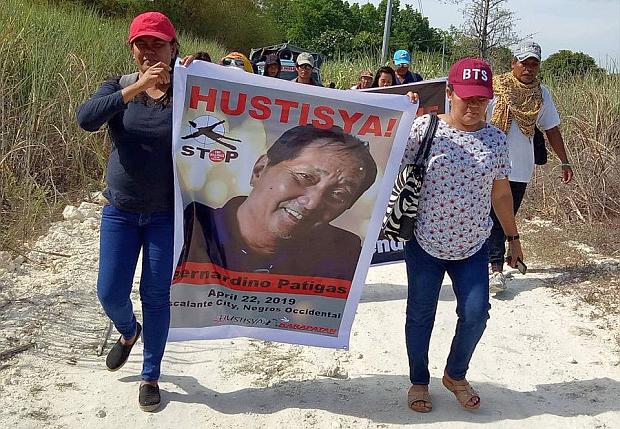
At least 5,000 relatives, friends, and activists attend the burial of slain Escalante City Councilor Bernardino “Toto” Patigas Sr. on Friday, April 26, 2019. (Contributed photo)
ILOILO CITY — The eldest son of a slain Councilor Bernardino “Toto” Patigas Sr. of Escalante City in Negros Occidental will substitute for his father who was running for reelection.
Eric Patigas, the eldest of the late councilor’ seven children, said he agreed to be the substitute candidate amid an overwhelming outpouring of sympathy and support for their family.
“We saw that it was not only our family who loved Papa but many who vowed to vote for him even if he is already gone. I have a regular work [as an engineer] but I cannot turn my back on my father’s legacy,” Eric told the INQUIRER on Sunday.
Motorcycle-riding assailants gunned down his father, a human rights advocate, on the afternoon of April 22 as he was driving his motorcycle on his way home to Barangay Washington in Escalante, 93 kilometers from the capital city of Bacolod in Negros Occidental.
The 72-year-old Patigas, former secretary general of the North Negros Alliance of Human Rights Advocates, was running for reelection as city councilor under the Nationalist People’s Coalition.
He was a survivor of the infamous Escalante Massacre in which 20 farmers and farm workers were gunned down by soldiers and paramilitary men while they were holding a protest on Sept. 20, 1985, against the Marcos dictatorship.
No suspects so far
On Friday, at least 5,000 residents and supporters of Patigas attended his burial at the Old Escalante Public Cemetery. More people went to his wake at his house.
Eric said they had been relying on the investigation being conducted by the Philippine National Police to determine the identities of the assailants and the motive of his father’s killing.
“They have no updates so far because they said they have difficulty pinpointing the assailants because they were wore bonnet masks,” Eric said.
Eric said his father had focused in recent years on his work as a city councilor but supported the work of human rights advocates.
Human rights organizations believe Patigas was targeted for his human rights advocacies.
Four hours after he was ambushed, eight leaders of progressive groups in Negros Occidental received death threats, warning them that they would be next.
His picture and those of other activists and leaders of militant organizations were displayed in April last year on the walls in Moises Padilla town in Negros Occidental, accusing them of being either members or supporters of the New People’s Army.
Rights lawyer Benjamin Ramos, one of those whose picture was also displayed, was also gunned down by unidentified assailants in Kabankalan City, also in Negros Occidental.
‘A martyr of sugar workers’s struggles’
In an earlier statement, San Carlos Bishop Gerardo Alminaza called Patigas “a martyr of the sugar workers’ struggles in the island of Negros.”
Alminaza offered condolences to the Patigas family and called for justice.
“In sadness, we all are crying out: End the Killings. These barbaric and calculated assassinations must end. We should not tolerate this kind of crime. Tay Toto was a dedicated human rights worker who himself became a victim by these uncontrolled killings of Filipinos,” the prelate said.
Alminaza paid tribute to Patigas as a “devoted church worker.”
He said the Patigas was a mission partner of the Carmelites in the city and was president of the Parish Pastoral Council of St. Francis of Assisi Parish in Old Escalante.
“He tirelessly worked for the Basic Ecclesial Communities program of the parish,” Alminaza said. “His faith moved him to serve his poor brothers and sisters and was admired by the locals because of his humility and simplicity.”
He said Patigas earned the affection of Escalante residents due to his service and elected him as city councilor.
“As city councilor, he amplified the voices of the toiling sugarcane workers, fisherfolks and urban poor; and organized mass actions, such as the annual commemoration of the Escalante Massacre,” the prelate said.
“He showed us the way to care for the oppressed. The life of Tay Toto is telling us not to forget our sugarcane workers but to continue working with them,” Alminaza said.